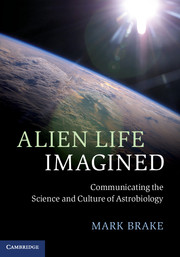Book contents
- Frontmatter
- Contents
- 1 Kosmos: aliens in ancient Greece
- 2 The world turned upside down: Copernicanism and the voyages of discovery
- 3 In Newton’s train: pluralism and the system of the world
- 4 Extraterrestrials in the early machine age
- 5 After Darwin: The War of the Worlds
- 6 Einstein’s sky: life in the new universe
- 7 Ever since SETI: astrobiology in the space age
- Index
- References
4 - Extraterrestrials in the early machine age
Published online by Cambridge University Press: 05 December 2012
- Frontmatter
- Contents
- 1 Kosmos: aliens in ancient Greece
- 2 The world turned upside down: Copernicanism and the voyages of discovery
- 3 In Newton’s train: pluralism and the system of the world
- 4 Extraterrestrials in the early machine age
- 5 After Darwin: The War of the Worlds
- 6 Einstein’s sky: life in the new universe
- 7 Ever since SETI: astrobiology in the space age
- Index
- References
Summary
It seemed to the ancients that there was only one Earth inhabited, and even of that men held the antipodes in dread: the remainder of the world was, according to them, a few shining globes and a few crystalline spheres. Today, whatever bounds are given or not given to the Universe, it must be acknowledged that there is an infinite number of globes, as great as and greater than ours, which have as much right as it to hold rational inhabitants, though it follows not at all that they are human.
It is only one planet, that is to say one of the six principal satellites of our Sun; and as all fixed stars are suns also, we see how small a thing our Earth is in relation to visible things, since it is only an appendix of one amongst them. It may be that all suns are peopled only by blessed creatures, and nothing constrains us to think that many are damned, for few instances or few samples suffice to show the advantage which good extracts from evil.
Moreover, since there is no reason for the belief that there are stars everywhere, is it not possible that there may be great space beyond the region of the stars? Whether it be the Empyrean Heaven, or not, this immense space encircling all this region may in any case be filled with happiness and glory. It can be imagined as like the Ocean, whither flow the rivers of all blessed creatures, when they shall have reached their perfection in the system of the stars.
What will become of the consideration of our globe and its inhabitants? Will it not be something incomparably less than a physical point, since our Earth is as a point in comparison with the distance of some fixed stars? Thus since the proportion of that part of the Universe which we know is almost lost in nothingness compared with that which is unknown, and which we yet have cause to assume, and since all the evils that may be raised in objection before us are in this near nothingness, haply it may be that all evils are almost nothingness in comparison with the good things which are in the Universe.
Gottfried Wilhelm Leibniz, Théodicée, trans. E. M. HuggardThe machine age, man-bats, and the Great Moon ‘Hoax’
By the dawn of the nineteenth century the early vision of material progress through science had been achieved. Science had secured its dominion over nature. Newtonianism had established its authority in the clanging new workshop of the world that was Victorian Britain. ‘Were we required’, wrote Thomas Carlyle in 1829, ‘to characterise this age of ours by any single epithet, we should call it the Mechanical Age’.
- Type
- Chapter
- Information
- Alien Life ImaginedCommunicating the Science and Culture of Astrobiology, pp. 132 - 163Publisher: Cambridge University PressPrint publication year: 2012



